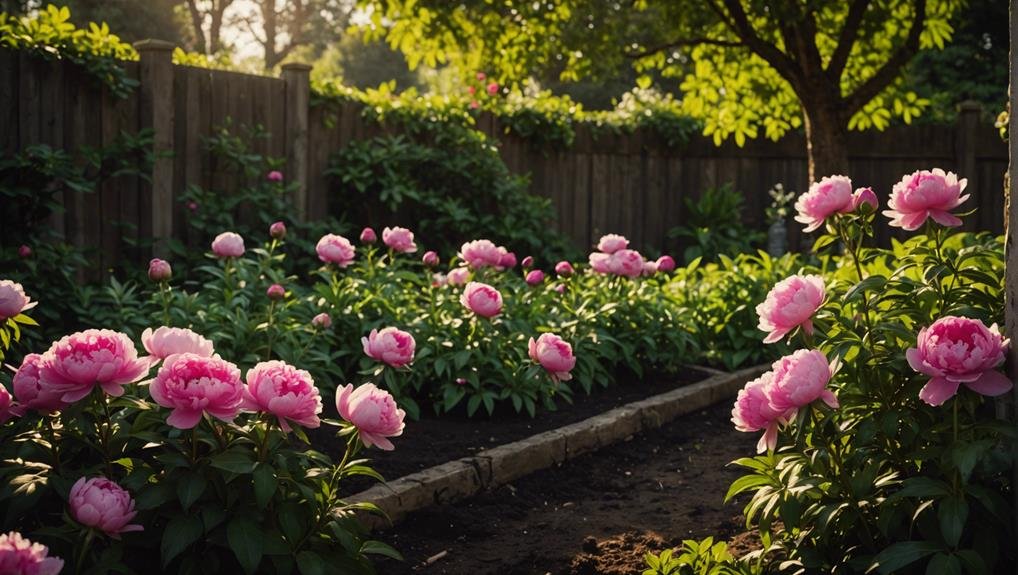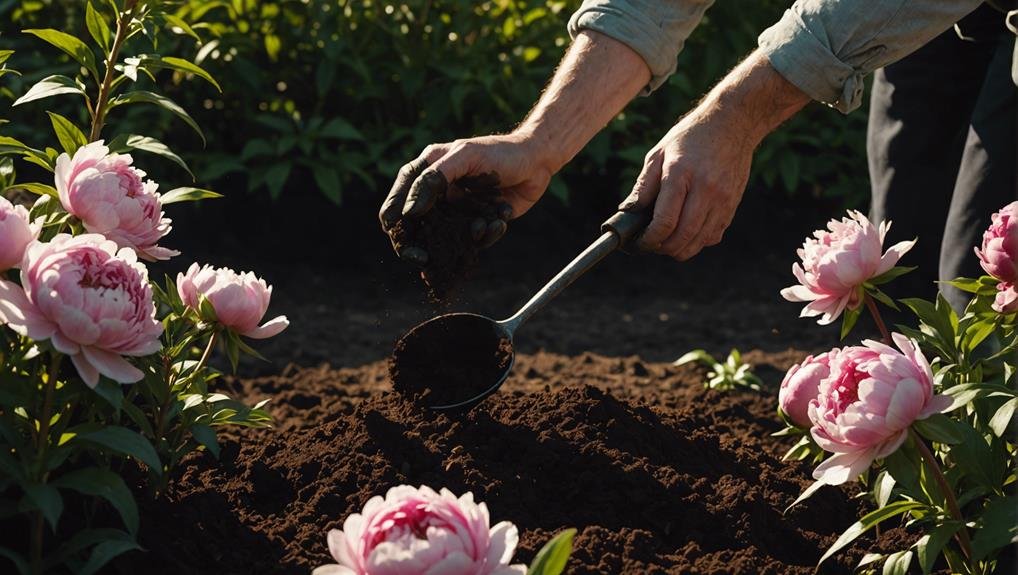Coffee grounds can have both positive and negative effects on peony growth. The caffeine in coffee grounds can act as a natural growth stimulant, but it's important to note that they are highly acidic with a pH of around 5.0.
Peonies, on the other hand, prefer slightly acidic to neutral soil with a pH of 6.5-7.0. When using coffee grounds in compost, they can provide nitrogen but may disrupt the soil's pH balance if used excessively.
To mitigate the acidity of coffee grounds, consider blending them with decaffeinated ones and balancing them out with neutral materials like lime. It's crucial to monitor the soil pH regularly when incorporating coffee grounds to ensure the best results for your peonies.
Experiment with different combinations to find the right balance in your compost for optimal peony growth.
Caffeine Content in Coffee Grounds
The caffeine content in used coffee grounds can significantly impact plant growth and soil health. Approximately, half a tablespoon of coffee grounds holds around 41 mg of caffeine, which acts as a natural stimulant to temporarily boost plant growth.
Moreover, caffeine in coffee grounds can act as a natural insecticide, keeping pests at bay in the soil. However, the caffeine levels can vary based on brewing methods, affecting its effectiveness and safety for different plants.
It's crucial to understand the caffeine concentration in coffee grounds before using them in gardening to ensure balanced and healthy plant development.
Ideal Fertilizers for Peonies
Peonies thrive best with fertilizers that support a slightly acidic to neutral soil pH, specifically between 6.7 and 7.
Fertilizers rich in phosphorus and potassium are particularly beneficial for promoting healthy blooms and root development. A balanced 10-10-10 or 5-10-10 fertilizer is recommended during the growing season.
Organic options, such as composted manure or bone meal, also provide essential nutrients without greatly altering soil pH. Avoid high nitrogen fertilizers, as they can lead to excessive foliage growth at the expense of flowers.
Incorporating lime or wood ash into the soil can help maintain the desired pH balance. Regular soil testing ensures the ideal nutrient levels and pH for thriving peonies.
Coffee Grounds in Compost

When adding organic materials to compost for peonies, it's important to understand the role and impact of coffee grounds. Coffee grounds are a valuable nitrogen source that enhances the nutrient profile of compost, benefiting plant health with antioxidants.
However, moderation is key due to the caffeine content in coffee grounds, which can be harmful in excess. Opting for decaf coffee grounds with lower caffeine levels is advisable.
While coffee grounds can enrich compost, it's essential to balance them with other materials to avoid over-acidification. Adding lime or wood ash can help neutralize any potential acidity.
A well-balanced compost mix supports the healthy growth of peonies, which thrive in slightly acidic to neutral soil conditions.
Impact on Soil Ph
Understanding how coffee grounds affect soil pH is crucial for maintaining optimal conditions for peony growth.
Coffee grounds naturally have an acidic pH of around 5.0, which can significantly lower the soil pH when added directly.
Peonies, however, thrive in slightly acidic to neutral soil with a pH range of 6.5 to 7.0. The addition of coffee grounds can disrupt this balance, making the soil less favorable for peonies.
This shift in pH can impact nutrient availability and overall plant health. While coffee grounds offer nutrients, it's important to manage their acidity carefully to avoid harming the delicate pH balance needed for peonies to flourish.
Best Practices for Use

To maintain the health and vigor of peonies while incorporating coffee grounds, it's crucial to follow optimal methods that balance nutrient advantages with soil pH regulation.
Instead of directly applying coffee grounds around peonies, it's recommended to blend them into a well-rounded compost mix. This mix should include neutral or alkaline components like lime and wood ash.
Consider using decaffeinated coffee grounds to avoid potential issues related to caffeine. Apply this compost mixture sparingly to uphold the ideal soil pH range of 6.7-7 for peonies.
Regularly check soil pH levels and adjust the compost composition as needed. By following these guidelines, peonies can benefit from nitrogen without compromising their preferred soil conditions.
Conclusion
Considering the advantages and drawbacks of using coffee grounds for peony cultivation, it becomes clear that a nuanced perspective emerges. While the nitrogen content and insecticidal properties can be beneficial, the acidic pH and varying levels of caffeine pose significant risks.
Peonies prefer slightly acidic to neutral soil, making the acidity of coffee grounds a concern. Therefore, despite some potential benefits, the overall impact of using coffee grounds on peonies tends to be more negative.
This highlights the importance of being cautious and precise when applying coffee grounds, if choosing to use them at all.












